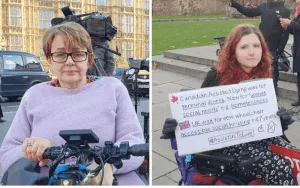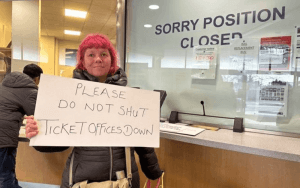Labour’s rail minister had made a series of promises that could see “the beginning of the end” of sub-standard assistance for disabled passengers on the railway, following lobbying by two disabled peers.
Lord Hendy, former chair of Network Rail, told the House of Lords yesterday (Wednesday) that he was “personally ashamed” of the way the rail industry treated passengers who need assistance.
He said he was sending “a clear signal to train operating companies that they cannot ignore their legal duties to support disabled passengers and to ensure that disabled passengers have proper access to the railway as they need and deserve”.
And he said he had been left “shocked” after being shown the number of different mobile phone apps that disabled people must use to book assistance, a wheelchair space and a ticket for their rail journeys.
He also pointed to the “lack of consistency in train design”, and the “lack of reliable, accurate information” on whether facilities such as station lifts and accessible toilets are working.
As well as promising to improve assistance, Lord Hendy proposed an amendment to the government’s passenger railway services (public ownership) bill, which would amend the Equality Act to make it clear that publicly-owned train companies are subject to the act’s public sector equality duty.
This should make it easier for disabled rail passengers to hold rail companies to account for access failures, as the government gradually takes operators into public ownership when contracts with private companies expire.
The minister’s pledges followed a meeting with two disabled peers – Liberal Democrat Baroness [Sal] Brinton and crossbench peer Baroness [Tanni] Grey-Thompson – and Liberal Democrat rail spokesperson Baroness Randerson.
Lord Hendy said: “Although it is the government’s view that the public sector equality duty [PSED] already applies to publicly-owned train operating companies, we are concerned that that is currently not as clear as it needs to be.
“By adding them to the list of public authorities in the act, we will ensure that there can be no mistake.
“Network Rail and Transport for London are already named in the act, but train operating companies previously were not, which is something that, if this amendment is agreed, we will remedy.”
This amendment to the bill was later agreed by peers.
Lord Hendy said the government’s future railways bill would allow Great British Railways (GBR) – the new over-arching body that will eventually run the rail system – to “begin to take a coherent approach” to access issues.
But he said some of the improvements should not have to wait for that bill to be passed.
He said the government would therefore begin to work with disabled people to develop an “accessibility road map” that would “explain the actions we intend to take to improve things for disabled people or others requiring assistance in advance of GBR being set up”.
He said the road map would include measuring and reporting on lift reliability and maintenance; confirming the legal obligation of rail operators to provide all disabled people with assistance when travelling, “whether or not a pre-booking has been made”; and improving “consistency” in the service provided to disabled rail passengers.
Lord Hendy said the government would also provide funding to improve the passenger assist app, and that this work “must be done” in consultation with disabled people, including Baroness Brinton and Baroness Grey-Thompson, to “ensure that it delivers the assistance that people deserve and addresses their needs”.
Baroness Brinton told fellow peers yesterday that disabled people had “for far too long been ignored by the train operating companies, with complex and different arrangements leading to chaos and unreliable services” and with many disabled people reporting “disrupted or poor services daily”.
She said the PSED amendment was “a big step forward” and the measures announced by Lord Hendy would eventually mark “the end of the current poor levels of assistance for passengers”, which would “transform the lives of disabled rail passengers”.
Last month, Baroness Grey-Thompson and Baroness Brinton described to fellow peers some of their experiences as disabled rail passengers.
Baroness Brinton spoke of the “absolute nonsense” of the multitude of mobile phone apps disabled people need to use to book their tickets and assistance, the “total chaos” of trying to arrange access at unstaffed stations, and the overall unreliable provision of assistance.
Baroness Grey-Thompson said the failure rate with assistance was “way too high, and many disabled people do not even try to travel because of the fear of what they expect”, while she also described the “victim blaming” of disabled people by rail staff when there is an assistance failure, with disabled people “constantly fobbed off and told it will never happen again” when they complain.
She told peers last month: “Quite frankly, I really dislike having to book, but I cannot face having to turn up at a train station and almost feel like I am begging to be allowed on the train.”
Meanwhile, the government has announced that Baroness Grey-Thompson will lead a new taskforce that will work with the industry and consumers over the next nine months to tackle the barriers to air travel for disabled passengers.
Among other disabled members are Sophie Morgan, a television presenter and founder of campaign group Rights on Flights; accessible transport campaigner Tony Jennings; and Helen Dolphin, a long-standing member of the Disabled Persons Transport Advisory Committee.
The taskforce will also include representatives of airlines, assistance providers and airports.
The group will agree “short- and long-term practical and achievable actions that can be implemented by the industry, the regulator or the government”.
Transport secretary Louise Haigh said: “For too long, disabled passengers haven’t had the standard of assistance and service they need.
“That’s why we are bringing together this expert taskforce to drive forward change.”
Baroness Grey-Thompson said: “I am looking forward to working with disabled people, industry experts and the Department for Transport to improve access to flying.
“It is essential that the rights of each passenger are protected at every aspect of their journey, so they can travel with the respect they deserve.”
Morgan said the government had “sent a powerful message to the community and airline industry, that change is in the air”.
Picture: (From left to right) Baroness Grey-Thompson, Lord Hendy and Baroness Brinton speaking in the debate
A note from the editor:
Please consider making a voluntary financial contribution to support the work of DNS and allow it to continue producing independent, carefully-researched news stories that focus on the lives and rights of disabled people and their user-led organisations.
Please do not contribute if you cannot afford to do so, and please note that DNS is not a charity. It is run and owned by disabled journalist John Pring and has been from its launch in April 2009.
Thank you for anything you can do to support the work of DNS…

 Assisted suicide vote will make other campaigning tougher, say activists
Assisted suicide vote will make other campaigning tougher, say activists Seven supermarket chains have introduced inaccessible fridges in their stores, say disabled shoppers
Seven supermarket chains have introduced inaccessible fridges in their stores, say disabled shoppers Rail company’s ‘stealth’ ticket office cuts plan is ‘unforgivable’ and ‘horrendous’
Rail company’s ‘stealth’ ticket office cuts plan is ‘unforgivable’ and ‘horrendous’